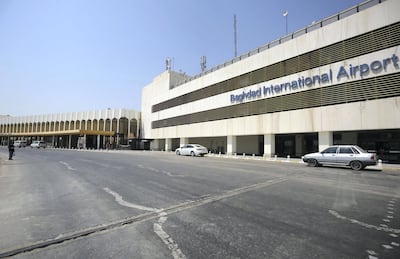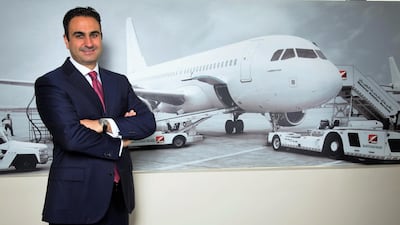Kuwait's National Aviation Services plans to create jobs for more than one hundred Iraqis as it takes on a nine-year contract to operate two terminals at Baghdad International Airport, the country's largest.
Iraq's Civil Aviation Authority has tasked the company with upgrading two of the airport's terminals, as well as handling all passenger services. The company will refurbish and upgrade the terminals' infrastructure and facilities. It will also install new equipment and technology, including automated systems and provide for passengers with special needs.
"There will be significant job creation," said NAS group chief executive Hassan El-Houry, who is also the co-author of Fly Africa, a book that looks at the future of aviation and its economic impact on the continent.
NAS entering the scene is a boon to the country, which has seen unemployment increase to about 20 per cent, as the economy is set to contract 5.6 per cent this year due to lower oil prices and the impact of the Covid-19 pandemic, according to the Institute of International Finance.
More jobs are likely to be created over the course of NAS' contract for Baghdad airport, Mr El-Houry said.
"The beauty of aviation is that it's an international language. So, as we train young men and women, they will definitely be employed by us in Iraq – they can be employed by others in Iraq," he said.
"They can definitely seek employment throughout the Middle East, being bilingual, being trained in aviation, which was, prior to Covid-19, a thriving industry."

NAS, which has more than 8,000 employees, provides services including ground handling and cargo and lounge management, at 50 airports in 20 countries including India, Morocco, Italy, Liberia, Rwanda and the UAE.
Providing jobs for Iraq's population is more urgent than ever for the government. The country has been grappling with a number of pressing issues, even before the pandemic. Its youth have been protesting for a year over a lack of economic opportunities, corruption and Iranian interference. A lower oil price has also impacted government revenue.
"Despite all of its challenges, Iraq has a very vibrant aviation sector ... a lot of domestic flights connecting the different cities," Mr El-Houry said. "And then you have flights connecting Baghdad and Basra and Najaf, to Kuwait, Saudi Arabia, Egypt, Istanbul, Beirut, Sharjah, Abu Dhabi, Doha."
The Baghdad terminals NAS will operate serve all major airlines flying in and out of the country, apart from the national carrier Iraqi Airways, which has its own terminal. Baghdad airport re-opened in July, following a four-month suspension of flights due to the Covid-19 pandemic.
Mr El-Houry aims for NAS' work at the airport to give airlines the confidence to increase flights or begin flying to and from there, increasing Iraq's connectivity with its neighbours and beyond.
"Iraq, historically was a hub in the region, whether for tourism, for transportation or for trade. Our objective as an Arab aviation company and as an international aviation company, was to stand with the Iraqi civil aviation [authorities] and play our part for Baghdad to regain its historic position," he said.
This is not NAS' first foray into Iraq. It has been training hundreds of Iraqi men and women as it builds an aviation training academy in partnership with the Najaf Airport Authority, since signing a contract last year.
The idea is that some of them will work for NAS in Baghdad and eventually throughout the country and the region, Mr El-Houry said.
"Our goal is to do a really good job in Baghdad, and then just start looking at other airports like Mosul, Kirkuk, Anbar and of course, Nasiriyah."
In the medium term, investment is planned for its Baghdad airport operations, Mr El-Houry said.
"I want to make one of these two terminals, a smart terminal. So, basically everything to be paperless and contactless and really put the terminal to par with some of the world's best and international passenger terminals."
Technology will play a key part in the future of travel post-Covid 19, Mr El-Houry said. For example, NAS has been using a system in Kuwait which connects certified coronavirus testing labs with the airport to ensure certificates for negative results presented by passengers are genuine. There is also a huge training component for staff to ensure they know how to safely handle passengers and are wearing the correct protective equipment.
In March, all 50 of the airports it operates at were shut to commercial traffic as a result of Covid-19 related travel restrictions, Mr El-Houry said. That came after a record January and February.
"So it was hard, it was very, very, very challenging. We had a very difficult March, April, May, and June. And then in July ... some airports started to open up more and more, to evacuation flights and VIP travel and certain government flights."
Even as the company begins to experience a recovery, it is still suffering from the effects of the pandemic, but Mr El-Houry remains "very optimistic".
"Aviation is really a lifeline for the world economy, it supports so many other sectors ... you need to have a vibrant aviation sector ... I remain confident that throughout next year, we'll see the aviation sector around the world continue to recover," he said.
Challenges remain, particularly a lack of cohesion when it comes to Covid-related travel restrictions and rules, which vary from country to country.
"I would really hope that the international bodies that regulate air travel would come out with some sort of unified guideline on how and what they advise airports to do. And I hope that airports adopt that, so that we can restart air travel in a safe manner. So that airports can speak to one another, labs can speak to airports, passengers know what the protocols are ahead of time. So that it facilitates travel. And that's what I would like to see."


